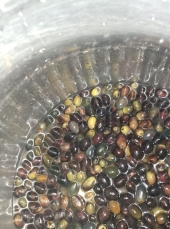
 4
4








Our inability to change everything should not stop us from changing what we can.




Robert Ray wrote: Would you consider a stainless pot? Some turkey fryer pots are pretty large and cost considerably less than my german crock.




 1
1




find religion! church
kiva! hyvä! iloinen! pikkumaatila
get stung! beehives
be hospitable! host-a-hive
be antisocial! facespace




Xisca - pics! Dry subtropical Mediterranean - My project
However loud I tell it, this is never a truth, only my experience...




Rather than learning to be both a cooper and a wainwright, it might be easier to contact a large Science Supply firm that can sell you a wide variety of glass flasks and bowls. One advantage is you can order them graduated, that is with measuring amounts indicated on the glassware. They are built to withstand the effects of acid so there would not be any leaching, however this would also avoid drawing in a good many flavors that you might get if you did actually use barrels.tel jetson wrote:you could always take up cooperage and make some yourself.
 2
2




Pics and text about my fermentation adventures: http://brewathonlite.blogspot.com




 4
4




Check out Redhawk's soil series: https://permies.com/wiki/redhawk-soil




"I - am a thoughtful guy. I think alotta thoughts; about alotta things." Rhett and Link









Check out Redhawk's soil series: https://permies.com/wiki/redhawk-soil




Pics and text about my fermentation adventures: http://brewathonlite.blogspot.com
 1
1












Blazing trails in disabled homesteading
 1
1




Miki DaShrew, the Fat Farmgirl
...Just a girl, searching for Heaven on earth....
 2
2




Miki DaShrew, the Fat Farmgirl
...Just a girl, searching for Heaven on earth....
 2
2




Johnny Niamert wrote:
Glass jars with glass lids. Clear, wide-mouth. I used to use mason jars, till I noticed how bad the brine would affect the lid and rust with even slight contact.
Miki DaShrew, the Fat Farmgirl
...Just a girl, searching for Heaven on earth....
 1
1




 5
5




thomas norris wrote:Inexpensive is relative to duration of use In my opinion. A crock will be something that can last well over 100 years. They also stabilize the temperature inside and have been used for a few thousand years for storage and fermentation
Miki DaShrew, the Fat Farmgirl
...Just a girl, searching for Heaven on earth....
 3
3




Miki DaShrew, the Fat Farmgirl
...Just a girl, searching for Heaven on earth....
 2
2




 4
4




Gardens in my mind never need water
Castles in the air never have a wet basement
Well made buildings are fractal -- equally intelligent design at every level of detail.
Bright sparks remind others that they too can dance
What I am looking for is looking for me too!









 1
1




William Bronson wrote:
A note on stainless steel.
Someone suggested that strong acids would leach nickle out of steel.
Was that in reference to stainless as well?
Miki DaShrew, the Fat Farmgirl
...Just a girl, searching for Heaven on earth....




 2
2




Gardens in my mind never need water
Castles in the air never have a wet basement
Well made buildings are fractal -- equally intelligent design at every level of detail.
Bright sparks remind others that they too can dance
What I am looking for is looking for me too!

 1
1




Mediterranean climate, hugel trenches, fabulous clay soil high in nutrients, self-watering containers with hugel layers, keyhole composting with low hugel raised beds, thick Back to Eden Wood chips mulch (distinguished from Bark chips), using as many native plants as possible....all drought tolerant.
 1
1




 2
2




Miki DaShrew, the Fat Farmgirl
...Just a girl, searching for Heaven on earth....

|
Destiny's powerful hand has made the bed of my future. And this tiny ad:
Learn Permaculture through a little hard work
https://wheaton-labs.com/bootcamp
|



